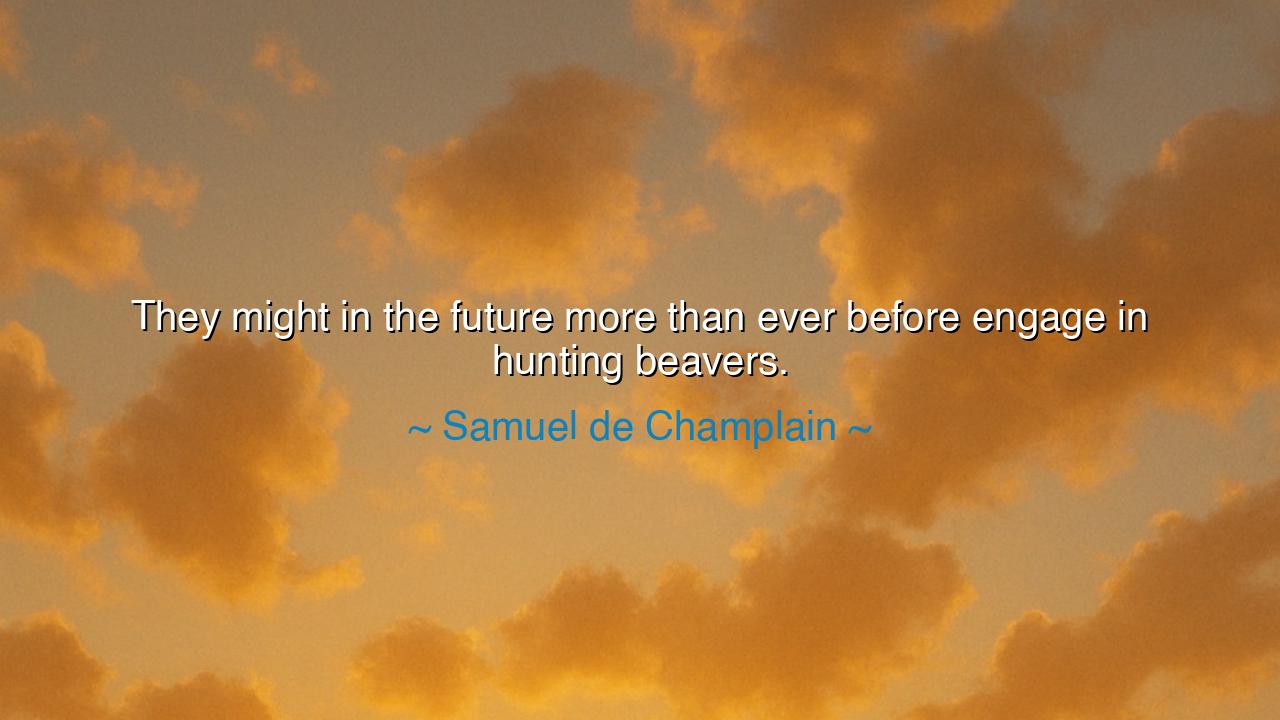
They might in the future more than ever before engage in hunting






“They might in the future more than ever before engage in hunting beavers.” Thus wrote Samuel de Champlain, explorer, cartographer, and father of New France, in the early 17th century. Though at first glance his words appear simple—concerned merely with trade and the beaver, that industrious creature of the northern rivers—beneath them lies a vision of change, of human ambition, and of the inexorable march of civilization. For Champlain, who looked upon the unbroken wilderness of North America with both awe and purpose, foresaw not only the commerce of pelts, but the transformation of worlds. His was a prophecy of what happens when desire and opportunity meet, when the hunger for progress awakens in the heart of man.
The origin of this quote lies in Champlain’s detailed accounts of his travels and his dealings with the Indigenous peoples of North America. In his time, the beaver pelt had become a treasure of the Old World—soft, luxurious, and in high demand for the making of hats and garments. The European markets hungered for it, and Champlain, visionary and pragmatist alike, saw that this humble animal would become the foundation of a vast new economy. But in his observation—“they might in the future more than ever before engage in hunting beavers”—there is both excitement and foreboding. He understood that greed, once awakened, rarely sleeps again. What began as necessity would become enterprise, and what began as enterprise might become exploitation.
In this way, Champlain’s words hold more than historical significance—they speak to the nature of human pursuit. The beaver was not merely a creature to be hunted; it was a symbol of resource, of wealth, of progress. And yet, as with all symbols of wealth, it carried a warning: that unchecked ambition, left untempered by wisdom, consumes the very world that sustains it. The rivers that once teemed with life would one day run empty, and the forests echo with silence. Champlain’s insight, though practical, becomes a parable—a reminder that every age has its “beaver,” its object of desire that drives discovery, innovation, and destruction in equal measure.
History has seen this pattern repeated countless times. Consider the California Gold Rush of the 19th century. What began as a dream of prosperity for a few became a fever that drew hundreds of thousands across oceans and plains. The mountains were stripped, the rivers poisoned, and entire cultures displaced in the name of progress. Like the hunters of Champlain’s time, the gold-seekers believed they were simply pursuing opportunity—but in their pursuit, they reshaped the land and the lives of those around them. The lesson of the beaver was forgotten, and once again, the world paid the price for man’s restless hunger.
Yet Champlain’s tone, though observant, is not cynical. He was a man of his time—a builder, an explorer, a bridge between worlds. He believed that trade and cooperation could unite peoples, that through mutual benefit the Old and New Worlds might learn from one another. His mention of increased hunting was as much a hope for prosperity as it was a cautionary observation. He saw in the industry of the beaver a reflection of humanity itself: the creature that works tirelessly, that shapes its environment, that builds and rebuilds with endless determination. Perhaps, he thought, if mankind could emulate the wisdom of the beaver—its balance between creation and need—then progress need not destroy what it touches.
Thus, in his brief and seemingly simple remark, Champlain captures an eternal truth: that progress is a double-edged gift. The same spirit that drives invention can bring ruin if it is not guided by reverence. The beaver teaches us that mastery over nature must come with stewardship, and that prosperity must walk hand in hand with restraint. The one who hunts without wisdom will one day find nothing left to pursue. The wise, however, learn to harvest without depleting, to take without forgetting to give back.
So, my listener, take this as your lesson: in your own time, beware the “beavers” you chase—the ambitions, the possessions, the goals that promise fulfillment but may demand too high a price. Strive, but do not consume. Build, but do not destroy. Let your pursuits be guided by balance, as the rivers are guided by their banks. For the future, as Champlain foresaw, belongs not to those who take endlessly, but to those who preserve the flow of life for generations yet unborn.
And remember this: every age, whether of explorers, traders, or dreamers, must face the same test—the test of how we use our gifts. Champlain’s quiet warning, written centuries ago, is not about the beaver alone—it is about the eternal struggle between wisdom and desire. To heed it is to walk the narrow path between progress and preservation. To ignore it is to watch, as all our rivers of abundance turn, one by one, to dust.






AAdministratorAdministrator
Welcome, honored guests. Please leave a comment, we will respond soon